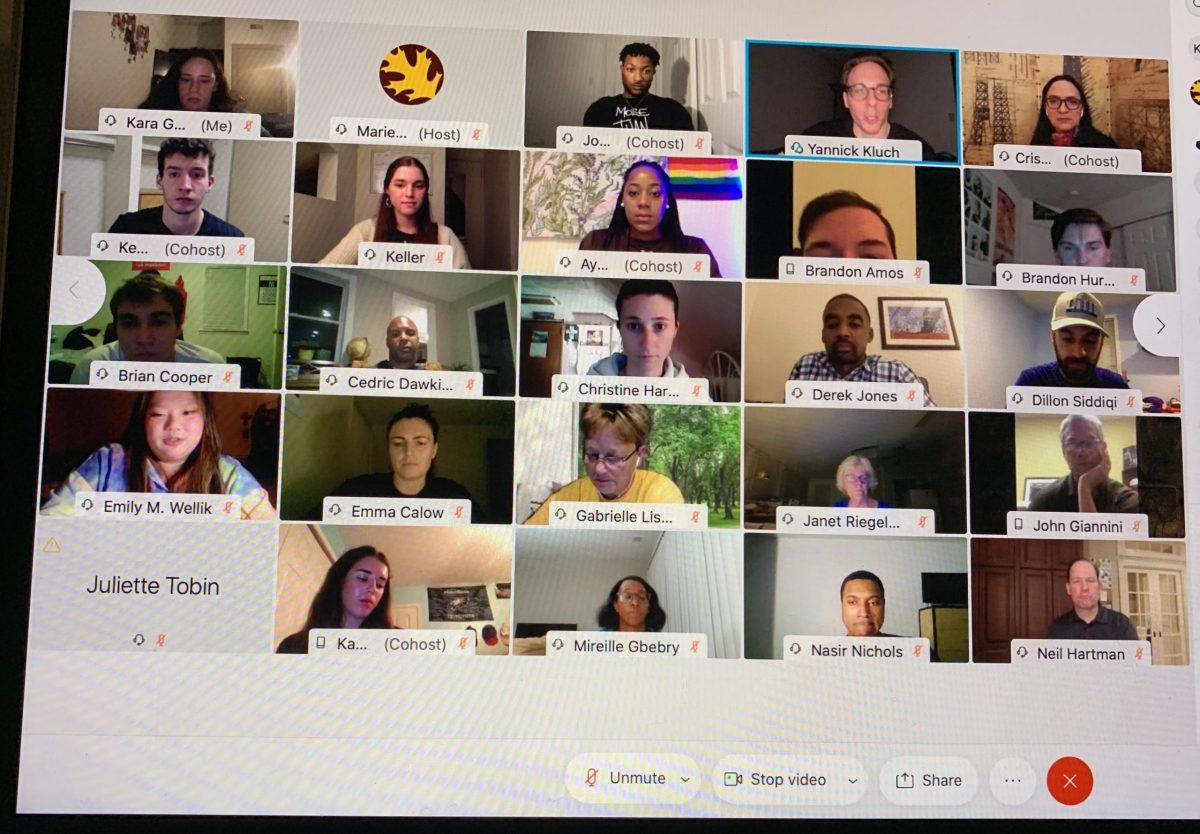Last Wednesday evening, Rowan University’s We Are One Team (WA1T), an organization that focuses on driving change in our communities through the power of sports, hosted a virtual panel discussion that featured Rowan student athletes and professionals from the athletic department. Both WA1T and the Student-Athlete Social Justice Committee hosted this event in conjunction with the 2020 NCAA Diversity and Inclusion week.
The panelists included men’s swimming and diving’s Kevin Gillooly, women’s basketball’s Ayanna Johnson, men’s track & field’s John Owens, women’s track & field’s Keller Bean, assistant coach of the Rowan track & field team Norm Tate and Rowan’s Interim Associate Athletic Director for Student-Athlete Welfare Dr. Cristina Fink.
With around 130 participants taking part in the discussion, moderator and faculty advisor for WA1T, Yannick Kluch ensured that every panelist had a chance to answer all of the questions and that the audience got to ask questions as well.
Each panelist stressed the importance of educating themselves and others when talking about the Black Lives Matter movement and systemic racism in America. When discussing the topic of George Floyd, who was killed over the summer by a police officer, the panelists were asked about how issues like this were brought up and discussed amongst teams here at Rowan.
“It was like an open table discussion,” Owens said. “I felt like it was our time to have that uncomfortable conversation that we never had.”
Johnson added how her team handled speaking about the topic to the conversation as well.
“The team had a discussion over Zoom, and it was just really interesting to see how much people on my team, and just people, cared,” Johnson said. “There were people that never felt like they had the opportunity speak out, or never felt like it’s their place to speak out, so they didn’t.”
The discussion continued with the panelists talking about how they can use their voices as student athletes to evoke change.
“I wanted to use all of the opportunities I could to keep speaking out against all the injustices and mistreatment that people face,” Bean said. “I found that I had a lot of opportunities to use my voice. Rowan has a lot of great programs, and you build a lot of connections through athletics, both on your team and through other athletes at Rowan.”
These student athletes spoke about the importance of using their platforms of social media as well. They are held to a different standard compared to other Rowan students; they are well-respected and can use their voices to promote change and educate others around them.
Both athletic department professionals who spoke on the panel, Tate and Fink, were also a part of Olympic teams. They shared their experiences and the injustices that they faced and talked about the differences in protests now and from when they were competing.
Tate was a part of the 1968 Olympics, which is one of the most well-known examples of protests in regards to racial injustice.
“The first thing that I observed is that you have more of a diverse protest going on,” Tate said. “Back in 1968, when we were considering boycotting the Olympic games, it was a Black thing. I just see a very diverse group protesting, and that’s what it’s going to take in this country.”
Fink talked about her experience as well, dealing with being called derogatory names, but also reminded people that we need to keep protesting.
“We really do need to keep protesting, it’s an action, it’s not just yes it’s great to say yes we’re allies or we’re anti-racist,” Fink said. “No, what are you actually doing? What are things that you can do to promote change? Are you registered to vote? What are the things that you can do to actually make a difference?”
The importance of being allies was also discussed. It is imperative that people are not just standing by but rather that they are being active allies for their communities.
“One of the most important parts of being an ally is to understand the full pain that oppressed groups are going through,” Gillooly said. “It’s not your place as an ally to judge the language of the oppressed.”
As an ally, it is important to be active and advocate for change even when it is no longer trending. If you want to be an active ally, you have to be active and continually use your platform, not just when everyone else is doing it.
Overall, the panelists stressed the importance of listening and understanding what others have to say. There’s going to be a point where you have to have that uncomfortable conversation with someone, and just by talking to even one person you can make a difference. Change is not going to happen overnight, but as more people are becoming allies and are educating themselves we will start to see some positive impacts.
For comments/questions about this story, email [email protected] or tweet @TheWhitOnline.

























































































































































!["Working with [Dr. Lynch] is always a learning experience for me. She is a treasure,” said Thomas. - Staff Writer / Kacie Scibilia](https://thewhitonline.com/wp-content/uploads/2025/04/choir-1-1200x694.jpg)









































